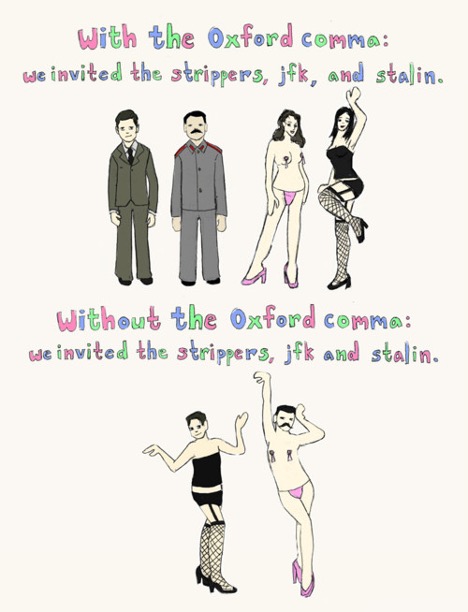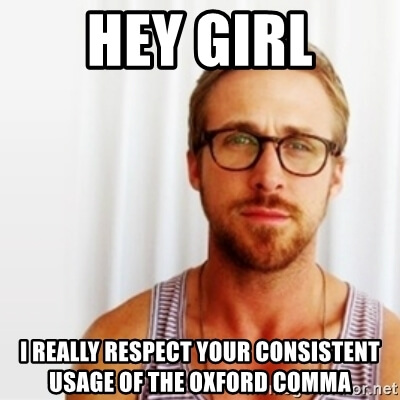The debate over the Oxford comma continues to rage. Who really cares? Most writers and editors are locked in a heated, intellectual battle over a tiny, little blob of ink. Sometimes, they calmly and respectfully discuss the punctuation mark’s merits. Other times, screaming matches ensue. Rumored to have gotten its name thanks to its famous use by the Oxford University Press, which has required its use since 1905, the Oxford comma is arguably one of the most confusing elements of grammar in the whole English language.
You can designate yourself as “Team Oxford” or “Anti-Oxford” with copious amounts of swag from either side of the great debate. So where do you stand? Here’s a brief, albeit comical, look at where we stand and why.
What the heck is the Oxford comma, anyway?
The Oxford comma (aka, the serial comma) is the final comma in a list. It appears after the second to last item, before the “and” that precedes the final item. Many think of it as the last comma in a series. For example:
- Go to the store and buy beach towels, suntan lotion, and water.
In this example, the Oxford comma appears after lotion.
What’s the debate over the Oxford comma?
Those on team “Oxford comma” argue that if we don’t use it, confusion and misinterpretation can result. While the outcome can be funny, it can also create an embarrassing OOPSS (OMG, Outrageous Punctuation and Spelling Slips). This example offers a comical demonstration of how omitting the Oxford comma can drastically change the meaning of a sentence.

Those on the other side of the debate contend that the Oxford comma is not only unnecessary, but that relying on it is also lazy. They say that a properly constructed sentence does not need an Oxford comma. And when character counts matter—as when setting up a printing press or creating a meta description for a website—the Oxford comma is often the first thing to go.
Legal Woes Related to the Oxford Comma

While the debate between writers and editors is more one of preference, the use of the Oxford comma (or its omission, rather) was at the heart of a legal battle between a dairy farm and its 127 milk drivers, who believed they were owed overtime pay. Oakhurst Dairy believed they were following Maine law by not providing overtime pay. The drivers, on the other hand, looked to the grammar to lobby a case that they were not included in the categories of employees exempted by Maine law from overtime pay.
Maine law states workers may not receive overtime pay for the following activities: “the canning, processing, preserving, freezing, drying, marketing, storing, packing for shipment or distribution of: produce, meat and fish producers, and perishable foods.” This appears to be clear, but without a comma after “shipment,” “the packing for shipment or distribution” is one activity. The drivers don’t pack food for shipment or for delivery. They just drive the trucks and deliver the goods. The U.S. Court of Appeals ruled in favor of the drivers, and Oakhurst Dairy agreed to pay out $5 million to settle the drivers’ claim.
Ironically, the Maine Legislative Drafting Manual still tells lawmakers to avoid the Oxford comma.
To Use or Not to Use—Depends on the Style Guide

Style guides exist to settle these sorts of debates and establish standards within industries. The Chicago Manual of Style (CMOS, used for books/magazines) and the Modern Language Association (MLA, used for academic work) both require the Oxford comma. As does the New Oxford Style Manual (not too surprisingly) and the Publication Manual of the American Psychology Association (APA). The Associated Press Style (AP, used for newspapers) and Canadian Style don’t require it. Determining whether or not you should use the Oxford comma depends largely on which industry you’re writing for and which style guide governs what is deemed “correct.”
Independent authors can decide either way. They just need to let their editors know their preferences, so they can make sure it is consistently used (or omitted) throughout.
As for me? I am Team Oxford comma. I work in Chicago Manual of Style for books and magazines and MLA for college writing. It offers clarity, and frankly, I’m used to it. If my clients have a clear preference, I’ll concede and happily adapt, although I might be silently correcting their grammar.
The Savvy Red Pen is Your Guide to Style
Do grammar gaffs make your palms sweat? Subscribe to the Savvy Red Pen Blog to get writing tips, stay current with language trends, and read about more OOPSS (OMG, Outrageous Punctuation and Spelling Slips).
Do you need help with your own writing? We offer a full line of editorial services for book authors, businesses, and students. Contact us today to learn more!

